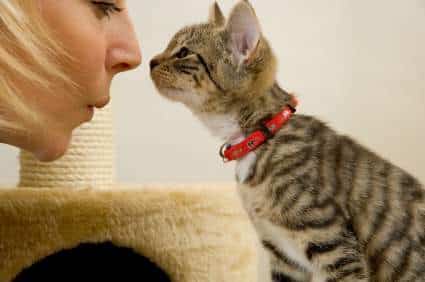
One of the first questions I get from individuals who find out what my career is, is “Wow, isn’t that difficult or depressing? I mean all of those sick animals; I don’t think I could ever do it.” I consistently receive the same look of surprise when I respond, “Actually, I think I have one of the most rewarding jobs out there, because of all of the joy I get from being a part of.”
As a Veterinary Radiation Oncologist, I am lucky enough to be able to provide cutting edge technology and medicine for our four-legged family members. The primary tool of my trade is a radiation machine that is able to deliver radiation to any part of the body. With this machine, I can deliver a beam of radiation to any organ or structure in order to damage and kill the cancer cells.
The radiation works by causing damage to the cancer’s DNA, “neutering” the mass and ridding the cancer of its ability to further replicate, and consequently the unstable cancer cells start to disappear. The radiation beam is similar to a flashlight that can focus a beam light onto a specific location. This beam can be shaped to any size or configuration and instead of “light,” the beam delivers high-energy X-rays. I like to use the light analogy because it helps me to explain why I do, what I do. Just like “light,” the radiation helps brighten an otherwise dark place of despair and unknown, giving hope, and I consider myself lucky enough to be a part of that process.
This treatment can be used for a variety of cancers, from soft tissue sarcomas to brain tumors. The time it takes for the tumor to shrink or disappear depends on the cancer. It can be as short as a couple of hours, or as long as 9 months. The important thing is that the cancer is not growing or spreading.
The people I get to meet are another part of what makes my job so rewarding. My clients are extremely diverse and generally do not fit into a specific mold. They may come from a variety of different social and economic backgrounds, but the one thing they have in common is that they all really love their companions and want the best for them. They come to me seeking knowledge and wanting to know their options, so they know what they can do to make a difference. At first they are scared, depressed, angry, or just don’t know what to expect, but really who wouldn’t be?
I have the good fortune to be able to provide them with knowledge about the unknown and most of the time offer them options. Not every option may be the right one for every animal, but usually there is something I can offer. There definitely are some challenging and sad times; however, they are far outweighed by the encouraging times and the amazing people I get to meet along the way. I am lucky enough to be able to laugh and cry with my clients, stay positive when all seems negative, and help them through some very uncertain decisions. I am able to serve as a compass in unfamiliar territory, and the bonds I have formed are too deep for plain words to do justice.
This brings me to the last but surely not the least important aspect of my job . . . the patients. The easiest way to describe the majority of my patients is that they are critters who are happy and healthy overall, but have an uncontrollable bump growing on or in their body. This “bump” could be as small as a dime or as large as a softball, and can be on any part of the skin, or more often just under the skin. If a patient is referred for radiation the cancer is usually confined to just 1 or 2 locations, and has not yet progressed to the bloodstream.
Most of the patients I see are between 8 and 20 years of age and they consist mostly of dogs and cats, although I have treated a few rabbits, ferrets, and the occasional horse. To me they are all special and I treat them all as if they were my own. Who is to say that all of our companions are not special, but I am biased when it comes to my patients. Imagine the best dog or cat you’ve ever had, you’ve grown up with them and they’ve seen you through many stages in your life, or you may have even just met him, but boy are they special. There are always a few grumpy companions out there, but I like to think of them as misunderstood. I’m sure every vet out there thinks his or her patients are the best, but that’s because they are what makes our jobs so rewarding.
Should you ever find yourself in the situation of your companion being diagnosed with a mass that is potentially treatable and you are seeking a specialist for information, I hope I am lucky enough to be that person. While it may only be for a couple of months or years, I hope I am able to be a part of the healing process.




